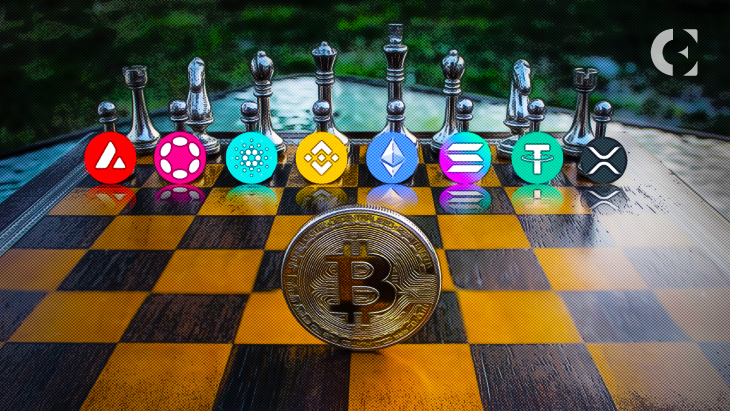What Is an Altcoin?
An altcoin is a combination of the terms “alt,” referring to “alternative,” and “coin,” associated with “cryptocurrency.” This means that all tokens other than Bitcoin (BTC) are altcoins. Bitcoin was the first cryptocurrency that introduced blockchain technology to the world and revamped the world of finance.
Alternative cryptocurrencies have been made to improve Bitcoin’s technical and practical challenges. The birth of altcoins was followed by the introduction of Litecoin (LTC) and Ether (ETH). While Bitcoin is frequently priced in currencies such as dollars, yuan, euros, and other fiat money, altcoins are typically priced in BTC.
How Do Altcoins Function?
Altcoins function using blockchain technology. A blockchain is a digital, distributed database that is simultaneously maintained by several computers globally. New transactions are authorized and recorded on the blockchain as blocks of transactions. These transactions cannot be reversed after they are recorded into a blockchain.
Altcoins share the same fundamentals as Bitcoin in using the blockchain as a trusted, distributed public ledger, which allows and records a transaction only if the transaction is legitimate. But many altcoins have taken this premise to either use it to achieve different goals or look out to improve flaws in Bitcoin.
Types of Altcoins
There are several types of altcoins available, depending on how it works and what purpose they serve. Let’s take a look at the four categories you’ll find when researching altcoins.
Stablecoins
Stablecoins are cryptocurrencies that are set to follow the price of another asset. Most of the biggest stablecoins are pegged to the USD and aim to stick to their value. In case the price fluctuates, the issuer of the coin will take measures to correct it.
Mining-based
Mining-based cryptocurrencies use a process called mining to verify transactions and add more coins to the supply, with miners using devices to solve complex mathematical equations. Basically, the first miner to solve the equation gets to verify a block of transactions. In exchange, miners who verify blocks receive crypto rewards.
Bitcoin is a mining-based cryptocurrency, therefore mining was the first method used to process crypto transactions.
Staking-based
Staking is a way of earning rewards for holding certain cryptocurrencies. Holders of a staking-based cryptocurrency can choose to stake their coins, in a way to use their coins to earn additional rewards. A validator, who is responsible for verifying transactions on a blockchain, is selected by the cryptocurrency’s blockchain technology to validate a block of transactions. Participants earn cryptocurrency incentives in exchange.
Governance
Governance tokens are cryptocurrencies that give holders voting rights to help in shaping the project. You can make and vote on cryptocurrency-related proposals using these tokens. This helps make the cryptocurrency a decentralized project since all the holders have authority by eliminating the say of one central authority.
Pros and Cons of Altcoins
Listed below are some of the pros and cons of Altcoins.
| Pros | Cons |
| Participation in a new technology | Volatile market |
| Crypto-specific uses | Significant risks, as many altcoins are scams |
| Offer high rewards | May be complex to use |
Altcoins vs. Bitcoin
Now let’s take a look at how altcoins differ from Bitcoin.
- Bitcoin was launched in 2009, whereas the first altcoin was launched in 2011. New altcoins are released regularly.
- Altcoin investments typically come with increased risk and reward. Although Bitcoin is volatile, it holds its position as the market leader and has gained significant value. Although altcoins have more potential for growth, they also have a greater risk of failure.
- Altcoins are more advanced. Since it came out after Bitcoin, they’ve improved on its technology. Many other cryptocurrencies are considerably superior to Bitcoin in terms of transaction costs and speeds.
Some Popular Altcoins
Here are some popular altcoins by the total dollar value of the coins in existence.
- Ethereum (ETH)
- Tether (USDT)
- USD Coin (USDC)
- Binance Coin (BNB)
- XRP (XRP)
Should You Invest in Altcoins?
You should consider investing in altcoins in case you can spend time researching them. Since altcoins aren’t that famous, they could see larger price fluctuations if they gain popularity.
There are some flaws in buying altcoins. Since there are a number of them, it’s challenging to pick out the best altcoins to invest in. Altcoins present a greater risk, and many of the smaller altcoins are uncertain investments or scams.
To sum it up, altcoins are best suited for cryptocurrency investors who are willing to do their research before investing. Cryptocurrency stocks are better if one is seeking a lower-risk or less time-intensive investment.
Where to Purchase Altcoins?
One can purchase cryptocurrency including altcoins on exchanges such as Coinbase, Gemini, or BlockFi. Several stock brokerages, including Robinhood and SoFi, also offer Bitcoin and altcoins.
Advanced crypto users can use a cryptocurrency wallet to buy altcoins directly, without the need for any crypto exchange.
To buy altcoins from a crypto exchange, you will need to enter your personal information and attach a payment method like a bank account or debit card. Once the account is created, you can begin your cryptocurrency journey.
Bottomline
When buying high-risk assets such as cryptocurrency, it’s important to understand that you could lose your entire investment. Traders must expect volatility, as the market is highly uncertain.
Altcoins continue to gain popularity, with more than a thousand of them in existence. The prices of altcoins can be very volatile and risky, making them unsuitable for all investors. As of now, no altcoin seems to be able to replace Bitcoin’s position as the most popular cryptocurrency.
Disclaimer: The information presented in this article is for informational and educational purposes only. The article does not constitute financial advice or advice of any kind. Coin Edition is not responsible for any losses incurred as a result of the utilization of content, products, or services mentioned. Readers are advised to exercise caution before taking any action related to the company.







